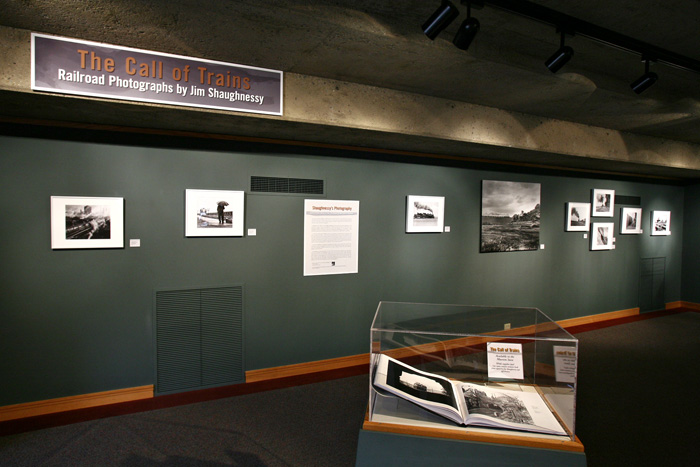About the Exhibition

Chicago, Burlington & Quincy 4–8–4 #5634 races toward Galesburg, Illinois, on an overcast afternoon in 1956. A record wheat harvest across the prairies the previous summer required the reactivation of stored steam engines, smartly set aside by the company’s management. Photograph by Jim Shaughnessy.
Shaughnessy and a small crew of his colleagues distinguished themselves from other railroad photographers of their generation by starting to think more photographically, exploring the camera’s potential more creatively. Collectively, and with the support and encouragement of then-Trains editor David P. Morgan, they blasted through the calcified bedrock of the three-quarter, wedge-shot tradition, developing a new visual language for railroad photography that in the 1950s found its way, slowly but surely, into the railfan print media. Because of these innovations, railroad pictures were lifted into the realm of art for the first time, warranting different consideration by photographers, editors, and the public.
As part of this advance guard, Shaughnessy made conscious decisions to see beyond trains, embracing the “ugly beauty” of industrial environments. This decision set him apart from most amateur photographers of the day. Despite his unusual status, Shaughnessy forged ahead, relying on intuition and passion. He buoyed himself and his craft with a healthy dose of self-reliance coupled to an inner drive that bordered on, and even crossed over into, obsession. His aesthetic choices demonstrated the desire to include the human element, the desire to place trains and locomotives in a broader context, and the desire to explore the railroad after dark. This man from Troy, New York, was a germinating force within the school of American train photography that was taking root in the late 1940s and early 1950s.
Shaughnessy’s depictions of America’s railroad culture within the urban townscapes, cities and rural topographies of the Northeast helped provide others with new visions. His content-filled compositions capture a sense of place and a sense of time, describing in well-observed moments how the engines, railroaders, terminals, yards, station architecture, geography and landscape looked.
Jim Shaughnessy (1933–2018) was an astute historian who bears witness to perhaps the most dynamic epoch of American transportation. He photographed in a region of the country that had more railroad companies operating per square mile than any other part of the nation. Both big systems and one-engine-on-the-roster wonders operated with esoteric equipment and inspired fabled stories. He covered them all exhaustively, with affection and without pretense. His deep connection to this past vividly brings it into the present, helping us realize the true importance of his work. His images are valuable documents that broaden our understanding of railroading’s visual culture at mid-century, successfully linking all who see them to railroading’s past in a way that only photographs can.
The Center produced The Call of Trains: Railroad Photographs by Jim Shaughnessy in conjunction with the book of same title by Shaughnessy and Jeff Brouws (W.W. Norton, 2008).

The installation of The Call of Trains, shown here at the California State Railroad Museum, features 11×14 in. prints on light-colored mats and frames. A copy of the book, which shares its name with the exhibition, is displayed under glass in the foreground.
This exhibition is on hiatus for maintenance
About the Exhibition
- 26 black-and-white prints
- 16×20 inches, matted and framed
- 1 introductory panel and 24 exhibition labels
- 130 linear feet, total
Contact
To book a showing or get more information, get in touch with the Center at 608-251-5785 or send an email to info [at] railphoto-art [dot] org.
Previous Venues
- James J. Hill House, Saint Paul, Minnesota, May 13 to August 31, 2023
- Allentown Art Museum, Allentown, Pennsylvania, November 10, 2022 to March 5, 2023
- Steamtown National Historic Site, Scranton, Pennsylvania, August 27, 2018 to November 27, 2018
- National Railroad Hall of Fame, Galesburg, Illinois, summer 2017 to summer 2018
- Oliver B. Jensen Gallery, Valley Railroad, Essex, Connecticut, June 25 through October 25, 2015
- As part of “All Aboard! Railroads and the Historic Landscapes They Travel, Monmouth Museum, Lincroft, New Jersey, November 16, 2014, through January 4, 2015
- California State Railroad Museum, Sacramento, February 6 through September 16, 2009
